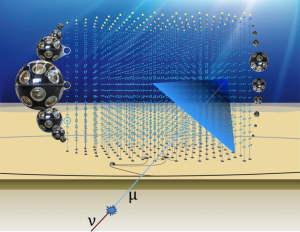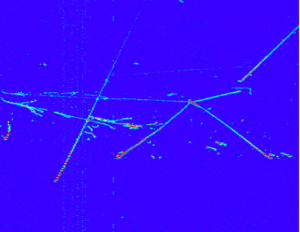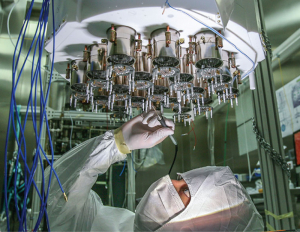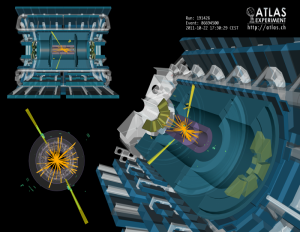The Particles group has developed its center of gravity over the past decade around neutrinos, exploring their role in the evolution of the universe, in astrophysical phenomena and in particle physics phenomenology. The group has been and is involved in a number of experiments aiming at precision measurements of oscillation parameters and tests of the three-neutrino paradigm (Double Chooz, DUNE, ORCA, Borexino), determining the neutrino mass ordering (ORCA, DUNE), and measuring the CP-violating phase (DUNE). The advantage of this manifold approach is also to have access to several neutrino sources like the Earth and the Sun (Borexino), reactors (Double Chooz), the atmosphere (ORCA, DUNE), and accelerators (DUNE).

|

|

|

|
While some of the group's experiments have reached their natural conclusions (Double Chooz and Borexino), the group has expanded its field of interest to the direct search for dark matter with participation in the DarkSide project. Indeed, low energy neutrino physics and dark matter physics share many experimental techniques and challenges such as those related to very low radioactive contamination. Very recently, the group has completed its scientific portfolio by integrating an activity mainly focused on the study of the Higgs boson in collider experiments, such as the ATLAS detector at the LHC and the FCC.
The research action of the group can therefore be divided into three main axes:
- precision tests to verify the Standard Model of particle physics (Higgs boson),
- the search for effects beyond the Standard Model (neutrino mixing, dark matter),
- astroparticle physics (Supernova, Earth and solar neutrino detection).
The interests of the group have a large complementarity and overlap. The group contributes to three experiments sensitive to the neutrino mass ordering which use two different types of detector technology (water Cherenkov and a liquid argon Time Projection Chamber), four different sources of neutrinos (atmospheric, reactor, solar and beam) and exploit two different underlying physical mechanisms: the matter-effect (ORCA and DUNE) and vacuum oscillations (Borexino). This later complementarity will open interesting avenues for future combined analyses and the wider goal of confirming the three-neutrino paradigm. Despite the difference in technology, we are developing synergies, in particular related to the detection of photons and associated electronics and acquisition (DUNE and DarkSide).
Neutrinos and the Higgs boson, although part of the Standard Model, are the two known particles most likely to allow, through their study, discoveries beyond the Standard Model. Measurements of neutrinos (ORCA and DUNE) and Higgs boson (ATLAS and FCC) properties and searches for tiny deviations from the theory at accelerator-based or collider-based particle-physics experiments rely on similar detection principles and analysis techniques. The presence of these two themes within the same particle physics team at the APC should therefore strengthen its discovery potential and be beneficial to all parties involved.
The group also has a cross-cutting project (LEAK) to exploit the synergies and complementarity of neutrino detection from core-collapse supernovae by exploiting the different interaction channels of DUNE, DarkSide and KM3NET/ORCA.
The Particles Team
Group Leader: Giovanni Marchiori
- BERNARDI Gregorio
- BOMBEN Marco
- CRIBIER Michel
- DAWSON Jaime
- DE ABREU BARBOSA COELHO Joao
- EL HEDRI Sonia
- FRANCO Davide
- KOUCHNER Antoine
- LASSERRE Thierry
- MARCHIORI Giovanni
- MIRONOV Camelia
- PATZAK Thomas
- SACERDOTI Sabrina
- TONAZZO Alessandra
- TROCME Benjamin
- VAN ELEWYCK Véronique
- VANNUCCI Francois
- VIGNAUD Daniel
- DUVERNE Pierre-Alexandre
- GOOS Isabel
- GRANGER Pierre
- HESSEL Timothée
- GALLI Matteo
- I CHEONG Hong
- MACHTS Janna
- MALOIZEL Alexis
- NIKOLOUDAKI Evangelia
- PULLIA Dario
- SIRONNEAU Camille
For more information, see the lab's activity report (2017-2021)
Links
